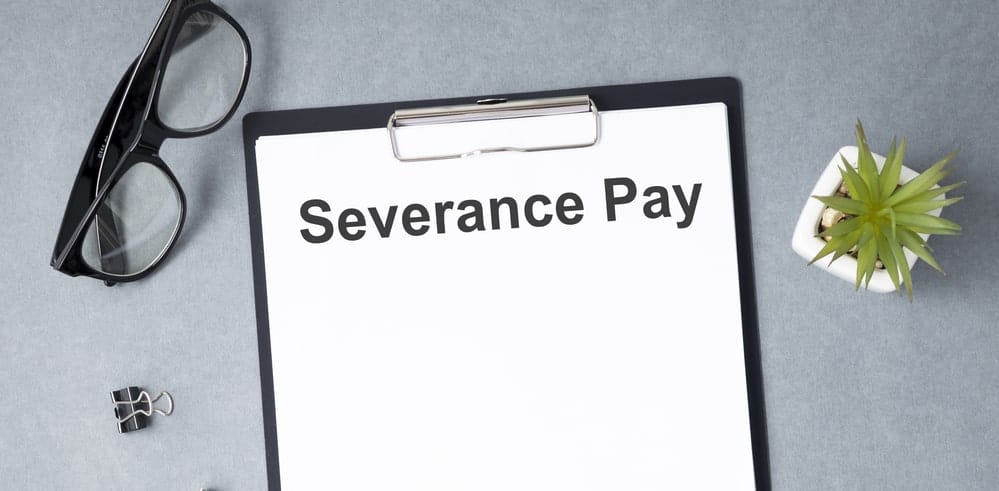
If you have been terminated in Alberta and are receiving (or may receive) severance pay, you have made the right decision to check how it affects your right to claim unemployment benefits here.
It does affect the income support you receive through the Employment Insurance (EI) program.
While this program provides welcome support for people who lose their jobs and can help them transition back into employment, a severance package will affect the benefits you receive even if you lose your job through no fault of your own.
Either it will preclude you from receiving payments for a while or you may have to pay back “overpayment” benefits you have received if your lump-sum severance package is paid to you after benefits have already begun.
How does severance affect unemployment benefits in Alberta?
If you accept a severance package upon termination of employment in Alberta, it will mean:
- You are not eligible to receive unemployment benefits until the expiry of your severance package (this is usually a specific number of months).
- If you receive unemployment benefits and subsequently receive a severance package, you will need to reimburse Service Canada for the benefits received during the period covered by your severance pay.
So, either you receive severance pay for your period of unemployment or you receive unemployment benefits. You cannot receive both {“double-dipping”).
How soon after termination should you apply for unemployment benefits in Alberta?
It is best to apply for EI benefits with Service Canada as soon as possible after you are terminated, and certainly within 30 days of losing your job. Otherwise, you may lose the benefits that you are entitled to.
If you are considering a severance package or taking legal advice about your next steps after being terminated, you should still apply for unemployment benefits. You do not need your Record of Employment (ROE) to apply in Alberta, although it is preferable to have it.
It’s better to receive unemployment benefits and pay them back later than to miss the deadline and receive nothing, i.e., apply for EI benefits and deal with the effects of any severance package later.
If I get a severance package, when will I receive EI benefits?
Unemployment benefit payments normally start around 28 days after you apply with Service Canada.
However, if you were paid a severance package and the period it covers has not yet expired AND separately you were approved for unemployment benefits, these payments will start when the severance package period expires.
Why does severance affect unemployment benefits?
If you are paid severance, it is like receiving a weekly wage, i.e., it is considered earnings.
Unemployment benefits are for an “interruption” of earnings and so they start when the severance pay period ends.
What if I don’t receive severance pay immediately after my dismissal?
It is quite common for terminated employees to want to assess their options and seek legal advice before accepting or negotiating a severance package.
So, severance payments may not begin immediately after your employment ends.
This should not affect your decision to apply for unemployment benefits. The clock is ticking after you are terminated and you must make your application with Service Canada within 30 days of your employment ending.
If you are awarded benefits and payments have started and you later settle for a severance package, you should inform Service Canada of the details. You will be notified about repayment of the “overpayment” benefits you have received but interest will not be charged.
Your ex-employer will likely require you to initiate a “notice of debt” with Service Canada before releasing the severance pay and may even agree to deduct the overpayment from the severance package.
Once the severance pay period has ended and there is no longer overlap between the two payments, you are eligible to start receiving unemployment benefits again.
If I am still unemployed after severance pay ends, how long can I receive unemployment benefits?
The total amount of unemployment benefits to which you are entitled is not affected by severance pay – only the timing of the payments.
Ultimately, if you were approved for nine months of EI but for the first six months of unemployment you were covered by your severance package, you may have to pay back some “overpayment” but you can still claim up to nine months of benefits if you cannot find a job and remain eligible in that time.
Of course, in the best-case scenario, you do not require these extra months of unemployment benefits because you have found a great new job during that time – and fortunately, you don’t have to repay your severance when that happens.
Get help with your severance package in Alberta
Employees in Alberta often have to fight for a fair severance package.
The experienced employment lawyers at Taylor Janis are accustomed to assessing severance packages and helping you obtain the maximum settlement.
We can advise you during a confidential telephone or video consultation about your severance pay rights.

We currently have three offices across Alberta — Edmonton, Calgary, and Red Deer. We serve the entire province of Alberta (and BC). We also have the infrastructure to work with any of our clients virtually — even the furthest regions of Alberta.
Call 1 (844) 224-0222 (toll free) to get routed to the best office for you or contact us online for general inquiries.
We also have a dedicated intake form to help you get the ball rolling. Our intake team will review your specific case and advise you on the next steps to take as well as what to expect moving forward.
Our offices are generally open 8:30 a.m.—4:30 p.m., Mon—Fri.


Heather Tyminski
WORKPLACE LAWYER
Heather is an associate practicing in the area of employment law. She takes a client-centered approach to enable her clients to make informed decisions. She has advised employers and employees on all aspects of the employment relationship, from the initial hiring stages up to termination.
PRIVACY NOTICE: Any information you provide to our office — whether your personal information or employment/employer details — will be treated as strictly confidential and will not be disclosed to your employer or to any other third party. So, please be reassured that you can talk openly to our capable Intake Paralegals worry free. Fill out an Online Inquiry or call us now, your information will be in safe and helping hands.
The Legal Review Process by Taylor Janis Workplace Law
- Taylor Janis strives for high-quality, legally verified content.
- Content is meticulously researched and reviewed by our legal writers/proofers.
- Details are sourced from trusted legal sources like the Employment Standards Code.
- Each article is edited for accuracy, clarity, and relevance.
- If you find any incorrect information or discrepancies in legal facts, we kindly ask that you contact us with a correction to ensure accuracy.


